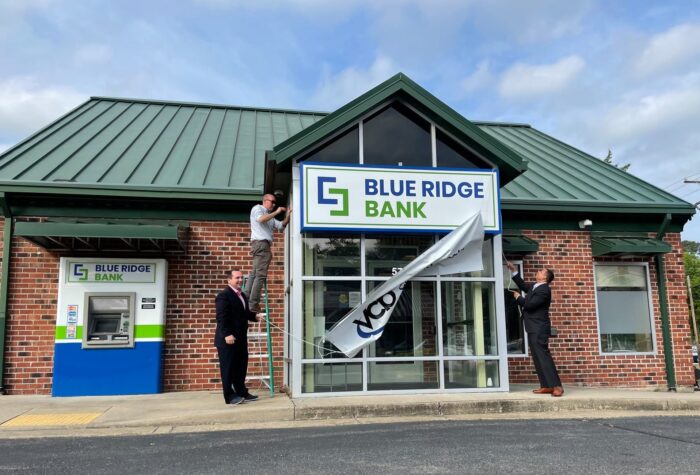
Blue Ridge entered the Richmond market via the acquisition of Virginia Commonwealth Bank. The deal included a branch on Patterson Avenue. (BizSense file photo)
As it grapples with regulatory scrutiny and a stock price in the doldrums, Blue Ridge Bank took a step last week toward raising a big batch of capital.
The bank, which is based in Charlottesville but keeps executive offices and a sizable branch presence in the Richmond area, earned shareholder approval during a special vote on March 6 to raise $150 million in capital from a group of investors.
Those investors include most notably Kenneth Lehman, who has a track record of propping up Richmond-area banks in need of capital. Lehman made his entrance into the local market in 2012 when he invested in the former First Capital Bank. He’s also the controlling shareholder of Midlothian-based Village Bank, owning around 51 percent of its shares, according to SEC filings.
Lehman, formerly of Northern Virginia and now based in Florida, will own approximately 25 percent of Blue Ridge common stock as part of the capital infusion. It will make him the $3 billion bank’s largest shareholder.
Investing alongside Lehman in the Blue Ridge deal is Castle Creek Capital Partners, which also has experience buying into local banks. It is among the largest shareholders of Henrico-based Primis Bank.
Castle Creek, through an affiliate, will own approximately 12.5 of Blue Ridge stock as part of the deal.
The capital raise calls for the issuance of 60 million new common shares, which will dilute its current 19.2 million shares outstanding. The new shares will be issued at $2.50 apiece.
That price is in line with the depressed state of Blue Ridge shares of late. Trading as BRBS, they closed last week at $2.66 apiece, up 6 percent for the month but down 77 percent over the last year.
Shareholder approval for the Lehman-led deal was one of two main steps needed to consummate the capital raise. Next is the thumbs up from regulators.
Blue Ridge CEO Billy Beale declined to comment on the pending transaction until regulators sign off.
Should it receive regulatory approval, the raise is aimed at shoring up Blue Ridge’s capital base while it works through a so-called consent order put in place over the bank by its main federal regulator, the Office of the Comptroller of the Currency.
That order, issued in January, is a stricter version of the previous written agreement Blue Ridge was hit with in 2022.
The heightened regulatory scrutiny is due to the bank’s “unsafe or unsound practices” related to assessing and managing risks posed by its relationships with third-party financial technology firms.
The consent order includes increased capital requirements and part of the capital raise also involves Lehman and Castle Creek developing an “asset resolution plan” aimed at creating a work-out strategy for the bank’s “criticized assets.”
Blue Ridge’s troubles came after a period of rapid growth that included the acquisition of River Community Bank in Martinsville in 2016 and Louisa-based Virginia Community Bank in 2019. Then came its marriage with Henrico-based Virginia Commonwealth Bank in early 2021, which doubled Blue Ridge’s size overnight and gave it a sizable presence in the Richmond area.
Later that year it attempted another merger with FVCBankcorp in Northern Virginia, but that deal was killed by regulators in early 2022. That rejection coincided with it being put under written agreement.
In a bid to work its way out of those problems, the bank brought Beale out of retirement last year to take the reigns from previous CEO Brian Plum, who resigned last summer.
Beale, who was the longtime leader of what is now Atlantic Union Bank, previously told BizSense that getting Blue Ridge out from under that regulatory scrutiny was one of his priorities.
Beale, in a prepared statement as part of the bank’s recently announced fourth quarter and year-end 2023 earnings report, said his work to revive the bank continues.
The bank lost $5.7 million in the fourth quarter and $51.7 million for the full year. That annual loss is compared to $17 million in profit in 2022.
Its deposits at year’s end totaled $2.5 billion, which was flat compared to the end of 2022 and down $210 million from the end of the third quarter of 2023. Its $2.6 billion in total loans at year’s end also was mostly flat compared to 2022.
Its troubles also included $62 million in nonperforming loans related to a group of specialty finance loans.
“During 2023, we initiated a period of aggressive and essential transformation to restore Blue Ridge Bank to its fundamental strengths and position it for the future,” Beale said in the earnings release. “These efforts, which continue into 2024, involve parallel initiatives across the entire organization to rationalize our businesses, tighten our lending focus, bolster our leadership talent, and assertively address our regulatory remediation efforts.
“While we have made many important steps forward, there is much more progress to be made. I have great confidence in the potential of Blue Ridge Bank and we are leaving no stone unturned in our efforts to return the bank to profitability and growth. Completing the private placement capital raise and diligently working to satisfy the most recent demands of our regulators will be important milestones on our journey over the next year. The goal of these collective efforts is a reinvigorated Blue Ridge Bank that is stronger and more resilient, has improved clarity of purpose, more focused business lines, and is well governed,” Beale continued.
The deal with Lehman and Castle Creek appears to be an alternative to another transaction Blue Ridge weighed in recent months. According to a report from S&P Global, the bank late last year fielded and ultimately rejected an offer to be acquired by North Carolina-based Southern BancShares, the parent of Southern Bank.
The report, citing anonymous sources, said Southern offered between $4.50 and $5.50 per share for Blue Ridge stock, a significant premium to where it’s trading currently.

Blue Ridge entered the Richmond market via the acquisition of Virginia Commonwealth Bank. The deal included a branch on Patterson Avenue. (BizSense file photo)
As it grapples with regulatory scrutiny and a stock price in the doldrums, Blue Ridge Bank took a step last week toward raising a big batch of capital.
The bank, which is based in Charlottesville but keeps executive offices and a sizable branch presence in the Richmond area, earned shareholder approval during a special vote on March 6 to raise $150 million in capital from a group of investors.
Those investors include most notably Kenneth Lehman, who has a track record of propping up Richmond-area banks in need of capital. Lehman made his entrance into the local market in 2012 when he invested in the former First Capital Bank. He’s also the controlling shareholder of Midlothian-based Village Bank, owning around 51 percent of its shares, according to SEC filings.
Lehman, formerly of Northern Virginia and now based in Florida, will own approximately 25 percent of Blue Ridge common stock as part of the capital infusion. It will make him the $3 billion bank’s largest shareholder.
Investing alongside Lehman in the Blue Ridge deal is Castle Creek Capital Partners, which also has experience buying into local banks. It is among the largest shareholders of Henrico-based Primis Bank.
Castle Creek, through an affiliate, will own approximately 12.5 of Blue Ridge stock as part of the deal.
The capital raise calls for the issuance of 60 million new common shares, which will dilute its current 19.2 million shares outstanding. The new shares will be issued at $2.50 apiece.
That price is in line with the depressed state of Blue Ridge shares of late. Trading as BRBS, they closed last week at $2.66 apiece, up 6 percent for the month but down 77 percent over the last year.
Shareholder approval for the Lehman-led deal was one of two main steps needed to consummate the capital raise. Next is the thumbs up from regulators.
Blue Ridge CEO Billy Beale declined to comment on the pending transaction until regulators sign off.
Should it receive regulatory approval, the raise is aimed at shoring up Blue Ridge’s capital base while it works through a so-called consent order put in place over the bank by its main federal regulator, the Office of the Comptroller of the Currency.
That order, issued in January, is a stricter version of the previous written agreement Blue Ridge was hit with in 2022.
The heightened regulatory scrutiny is due to the bank’s “unsafe or unsound practices” related to assessing and managing risks posed by its relationships with third-party financial technology firms.
The consent order includes increased capital requirements and part of the capital raise also involves Lehman and Castle Creek developing an “asset resolution plan” aimed at creating a work-out strategy for the bank’s “criticized assets.”
Blue Ridge’s troubles came after a period of rapid growth that included the acquisition of River Community Bank in Martinsville in 2016 and Louisa-based Virginia Community Bank in 2019. Then came its marriage with Henrico-based Virginia Commonwealth Bank in early 2021, which doubled Blue Ridge’s size overnight and gave it a sizable presence in the Richmond area.
Later that year it attempted another merger with FVCBankcorp in Northern Virginia, but that deal was killed by regulators in early 2022. That rejection coincided with it being put under written agreement.
In a bid to work its way out of those problems, the bank brought Beale out of retirement last year to take the reigns from previous CEO Brian Plum, who resigned last summer.
Beale, who was the longtime leader of what is now Atlantic Union Bank, previously told BizSense that getting Blue Ridge out from under that regulatory scrutiny was one of his priorities.
Beale, in a prepared statement as part of the bank’s recently announced fourth quarter and year-end 2023 earnings report, said his work to revive the bank continues.
The bank lost $5.7 million in the fourth quarter and $51.7 million for the full year. That annual loss is compared to $17 million in profit in 2022.
Its deposits at year’s end totaled $2.5 billion, which was flat compared to the end of 2022 and down $210 million from the end of the third quarter of 2023. Its $2.6 billion in total loans at year’s end also was mostly flat compared to 2022.
Its troubles also included $62 million in nonperforming loans related to a group of specialty finance loans.
“During 2023, we initiated a period of aggressive and essential transformation to restore Blue Ridge Bank to its fundamental strengths and position it for the future,” Beale said in the earnings release. “These efforts, which continue into 2024, involve parallel initiatives across the entire organization to rationalize our businesses, tighten our lending focus, bolster our leadership talent, and assertively address our regulatory remediation efforts.
“While we have made many important steps forward, there is much more progress to be made. I have great confidence in the potential of Blue Ridge Bank and we are leaving no stone unturned in our efforts to return the bank to profitability and growth. Completing the private placement capital raise and diligently working to satisfy the most recent demands of our regulators will be important milestones on our journey over the next year. The goal of these collective efforts is a reinvigorated Blue Ridge Bank that is stronger and more resilient, has improved clarity of purpose, more focused business lines, and is well governed,” Beale continued.
The deal with Lehman and Castle Creek appears to be an alternative to another transaction Blue Ridge weighed in recent months. According to a report from S&P Global, the bank late last year fielded and ultimately rejected an offer to be acquired by North Carolina-based Southern BancShares, the parent of Southern Bank.
The report, citing anonymous sources, said Southern offered between $4.50 and $5.50 per share for Blue Ridge stock, a significant premium to where it’s trading currently.



